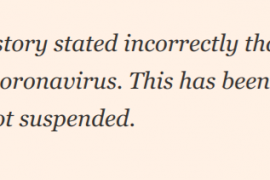A Financial Times article by Alexandra White (“US to rejoin Unesco after leaving over alleged anti-Israel bias”, June 12) included the following:
Unesco, the UN education and culture agency, announced US plans to rejoin the organisation in July after leaving during the Trump administration because of alleged anti-Israel bias.
…
The US left the agency in 2018, after it alleged anti-Israel bias over Unesco’s condemnation of Israel’s “aggressions” against Muslims’ access to a religious site in Jerusalem’s Old City.
That’s not accurate.
The problematic elements of the April 16, 2016 UNESCO resolution in question include the false claim that Israel denies Muslims the “freedom of worship”, and, most egregiously, the erasure of Jewish historical ties to the Temple Mount, Judaism’s holiest site, and the Western Wall – referring to the former as the “al-Aqsa Mosque/al-Haram al-Sharif” and the latter as “al-Buraq Plaza.”
To put this historical revisionism in context, even the Supreme Muslim Council’s (Wakf) 1925 Temple Mount Guide Book acknowledged a Jewish connection to the site which is “beyond dispute.”
This UNESCO framing, as CAMERA’s Sean Durns observed at the time, echoed the frequent propaganda of Palestinians officials – including Mahmoud Abbas, who called the Jewish history of Jerusalem a “delusional myth” in an Aug. 1, 2015, speech aired on the official PA TV station.
The UNESCO resolution even included a wild conspiracy theory, accusing Israel of “planting Jewish fake graves” at Muslim commentaries.
Also relevant in understanding the US criticism of the organisation is a July 7th, 2017, UNESCO resolution declaring the Cave of Machpelah (Tomb of the Patriarchs) an endangered ‘Palestinian’ world heritage site – again, erasing the Jewish connection to the holy site, and eliding the Hebron’s status as among the oldest Jewish communities in the world.
UNESCO’s pro-Palestinian propaganda claiming “Israeli aggressions against Muslims” at the Temple Mount was bad enough. But, the Financial Times’ whitewashing of the UN body’s antisemitic narratives denying the Jewish connection to Israel, thus portraying Jews as interlopers in the land, egregiously misleads readers.
We’ve reached out to Financial Times editors to communicate our concerns over the omission.





